英语人教版八年级下册Unit 3Could you please clean y
人教版八年级下册英语Unit3知识点总结
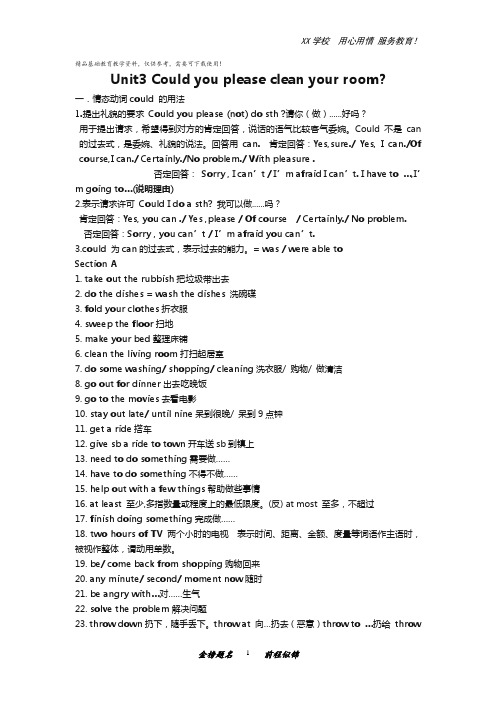
精品基础教育教学资料,仅供参考,需要可下载使用!Unit3 Could you please clean your room? 一.情态动词could 的用法1.提出礼貌的要求Could you please (not) do sth ?请你(做)......好吗?用于提出请求,希望得到对方的肯定回答,说话的语气比较客气委婉。
Could 不是can 的过去式,是委婉、礼貌的说法。
回答用can.肯定回答:Yes,sure./ Yes, I can./Of course,I can./ Certainly./No problem./ With pleasure .否定回答:Sorry , I can’t / I’m afraid I can’t. I have to (I)m going to…(说明理由)2.表示请求许可Could I do a sth? 我可以做......吗?肯定回答:Yes, you can ./ Yes ,please / Of course / Certainly./ No problem.否定回答:Sorry , you can’t / I’m afraid you can’t.3.could 为can的过去式,表示过去的能力。
= was / were able toSection A1. take out the rubbish把垃圾带出去2. do the dishes = wash the dishes洗碗碟3. fold your clothes折衣服4. sweep the floor扫地5. make your bed整理床铺6. clean the living room打扫起居室7. do some washing/ shopping/ cleaning洗衣服/ 购物/ 做清洁8. go out for dinner出去吃晚饭9. go to the movies去看电影10. stay out late/ until nine呆到很晚/ 呆到9点钟11. get a ride撘车12. give sb a ride to town开车送sb到镇上13. need to do something需要做……14. have to do something不得不做……15. help out with a few things帮助做些事情16. at least至少,多指数量或程度上的最低限度。
八年级下册人教版英语Unit3_Could_you_please_clean_your_room课件
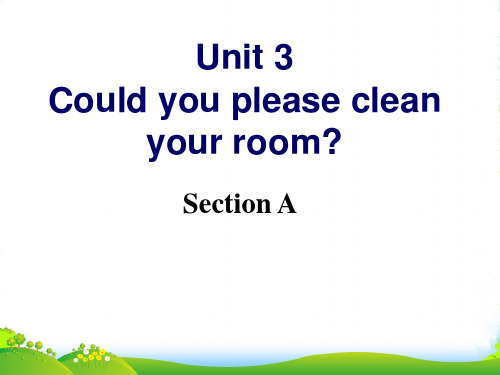
2. have to有人称、数、时态的变化, 而must只有一种形式。但must 可 用于间接引语中表示过去的必要 或义务。
He had to look after his sister yesterday.
3. 在否定结构中: don’t have to 表示 “不必”, mustn’t 表示“禁止”。 You don’t have to tell him about it. 你不一定要把此事
√
room
1c Pairwork
A: Could you please sweep the floor? B: Yes, sure. / I’m sorry, but I’m
reading the newspaper.
2a Listening and check “yes” or “no”.
have to和must
1. 两词都是 “必须”的意思, have to 表示客观的需要, must 表示 说话人主观上的看法, 既主观 上的必要。
My brother was very ill, so I had to call the doctor in the middle of the night. 我弟弟病得很厉害,我只得半夜里 把医生请来。(客观上需要做这件事) He said that they must work hard. 他说他们必须努力工作。 (主观上要做这件事)
cooking. I _c_a_n_ come later. 2. - _M__u_st_ we clean the windows today?
- No, you _n_e_e_d_n_’_t. You __c_a_nclean them tomorrow.
3. - _M__a_y I watch TV this evening, mum? - No, you _m_u__st_n_’_t. Work _m__u_s_t come first.
人教版英语八年级下册Unit 3听力原文及翻译
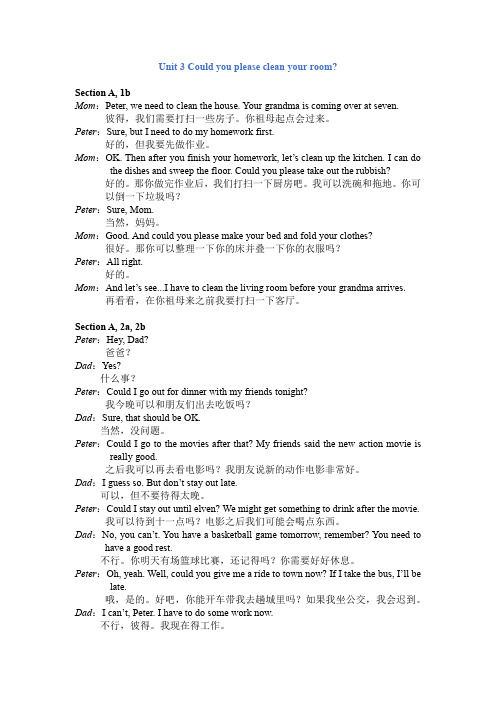
Unit 3 Could you please clean your room?Section A, 1bMom:Peter, we need to clean the house. Your grandma is coming over at seven.彼得,我们需要打扫一些房子。
你祖母起点会过来。
Peter:Sure, but I need to do my homework first.好的,但我要先做作业。
Mom:OK. Then after you finish your homework, let’s clean up the kitchen. I can do the dishes and sweep the floor. Could you please take out the rubbish?好的。
那你做完作业后,我们打扫一下厨房吧。
我可以洗碗和拖地。
你可以倒一下垃圾吗?Peter:Sure, Mom.当然,妈妈。
Mom:Good. And could you please make your bed and fold your clothes?很好。
那你可以整理一下你的床并叠一下你的衣服吗?Peter:All right.好的。
Mom:And let’s see...I have to clean the living room before your grandma arrives.再看看,在你祖母来之前我要打扫一下客厅。
Section A, 2a, 2bPeter:Hey, Dad?爸爸?Dad:Yes?什么事?Peter:Could I go out for dinner with my friends tonight?我今晚可以和朋友们出去吃饭吗?Dad:Sure, that should be OK.当然,没问题。
Peter:Could I go to the movies after that? My friends said the new action movie is really good.之后我可以再去看电影吗?我朋友说新的动作电影非常好。
人教版八年级下册英语第三单元知识点

人教版八年级下册英语第三单元知识点Unit 3 Could you please clean your room?一、重点短语1.go out for dinner出去吃饭2.stay out late在外面待到很晚3.go to the movies去看电影4.geta ride搭车5.work on从事6.cleanand tidy干净洁7.do the dishes洗餐具8.takeout the rubbish倒垃圾9.fold your/the clothes叠衣服10.sweepthe floor扫地11.make your/the bed整理床铺12.cleanthe living room打扫客厅13.no problem没问题14.welcomesb.欢迎某人e home fro m school/work放学/下班回家16.throw down扔下17.sit down坐下eover过来19.take sb.for a walk带某人去散步20.all the time总是21.all day/evening整日/夜22.dohousework做家务23.shout back大声回应24.walkaway走开25.a comfortable home一个舒适的家26.share the housework分担家务27.get some thing to drink拿点喝的东西28.insurprise惊讶地29.watch one show观看节目30.hangout闲逛31.pass sb.sth.把某物传给某人32.lend sb.sth.把某物借给某人33.get sth.wet使某物弄湿34.hate to do sth.讨厌做某事35.help sb.to do/with sth帮助某人干某事36.do chores做杂务37.bring a tent带顶帐篷来38.buy some snacks买些小吃39.invite sb to a party邀请某人参加聚会40.go to the store去商店41.make sb.do sth使某人做某事42.enough stress足够的压力43.a waste of time浪费时间44.inorder to为了45.get goodgrades取得好成绩46.minddoing sth.介意做某事47.developchildren’s independence发展孩子的独立性48.dependon依赖49.do ones part in(doing)sth.做某人分内的事50.look after/take care of 照顾;51.finish doing sth.完成做某事二、知识点解析1.“Could you please do sth.?”的答语以下两种情况:接受请求时可以用Yes,sure./Sure./Of course./Certainly./No problem./My pleasure./It’s my pleasure./With pleasure.等来回答拒绝请求时可以用Sorry./Sorry,I can’t.等来回答,还可以用Ihave to do sth.来解释其否定句是:“Could youplease not do sth.?”2.有关“家务劳动”有关的短语:takeout the rubbish/trash倒垃圾foldone’s clothes叠衣服sweepthe floor扫地cleanthe room打扫房间makeone’s/the bed铺床dothe dishes/wash the dishes洗餐具3.throw down扔下throwat扔向,掷向throw away扔掉例题:Recycling is good,so don’t__________bottles or newspapers.A.find outB.hand ine upD.throw away4.the minute表示“一…….就……”,相当于as soon as.(引导时间状语从句)e.g.:I’ll tell himthe minute he gets there.5.常见time的短语:all the time一直,总是at times不时,有时in time及时on time按时forthe first time第一次in no time立刻at any time随时bythe time到...的时候atthe same同时have a good/great/wonderful time玩的愉快例题:---Hurry up.It’s almost time for school.---Don’t worry.We are sure to be atschool__________.A.at timesB.on timeC.all the timeD.by the time6.as….as表示“和……一样”,之间要用形容词或副词的原级。
人教版八年级下英语Unit 3 Could you please cleanyourroom知识总结
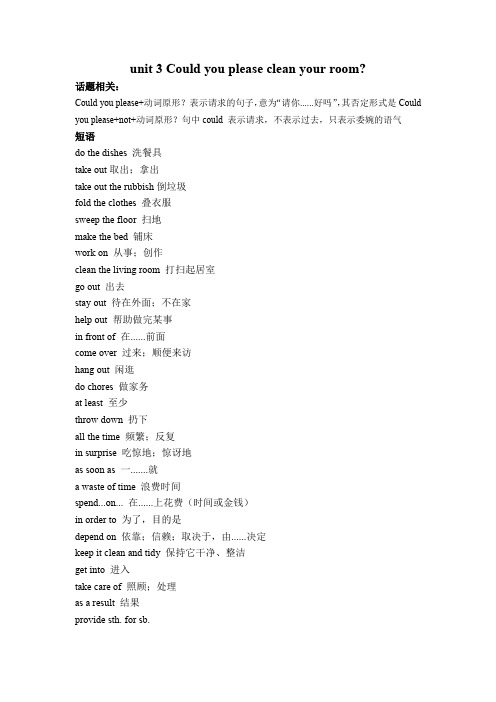
unit 3 Could you please clean your room?话题相关:Could you please+动词原形?表示请求的句子,意为“请你......好吗”,其否定形式是Could you please+not+动词原形?句中could 表示请求,不表示过去,只表示委婉的语气短语do the dishes 洗餐具take out取出;拿出take out the rubbish倒垃圾fold the clothes 叠衣服sweep the floor 扫地make the bed 铺床work on 从事;创作clean the living room 打扫起居室go out 出去stay out 待在外面;不在家help out 帮助做完某事in front of 在......前面come over 过来;顺便来访hang out 闲逛do chores 做家务at least 至少throw down 扔下all the time 频繁;反复in surprise 吃惊地;惊讶地as soon as 一.......就a waste of time 浪费时间spend...on... 在......上花费(时间或金钱)in order to 为了,目的是depend on 依靠;信赖;取决于,由......决定keep it clean and tidy 保持它干净、整洁get into 进入take care of 照顾;处理as a result 结果provide sth. for sb.=provide sb. with sth. 为某人提供某物a developed country 一个发达国家a developing country 一个发展中国家a life of independence 独立的生活an independent country 一个独立自主的国家have no idea “不知道”=don't knowtake care of “照顾;处理”=look after=care for take good care of “好好照顾......”=look after.....well as a result 结果;因此as a result of 由于.......;作为......结果句型和固定结构finish doing sth. 做完某事neither+连系动词be/助动词/情态动词+主语. .....也不hate to do sth. 厌恶做某事let sb. do sth. 让某人做某事spend...doing sth. 花费......做某事provide sth. for sb. 向某人提供某物learn to do sth. 学会做某事learn how to do sth. 学会怎样做某事do one's part in (doing) 尽自己的职责做某事as.....as... 与.......一样not as/so...as... 不如......borrow sth. from sb. “向某人借某物”hate sb./sth. 讨厌某人/某物hate to do sth./doing sth. 厌恶做某事enjoy doing sth 喜欢做某事buy sb.sth.=buy sth. for sb. "给某人买某物invite sb. to +地点名词“邀请某人到某地”invite sb. to do sth. “邀请某人做某事”make sb. do sth. 让/使某人做某事help with sth. =help (to) do sth.帮忙做某事There is no need for sb. to do sth.“对于某人来说,没有必要做某事”解释minute n.分钟;片刻(1)any minute now “随时;马上;在任何时刻”,表示事情有可能在极短的时间内发生或眼下就要发生。
(完整版)英语人教版八年级下册Unit3Couldyouplease--
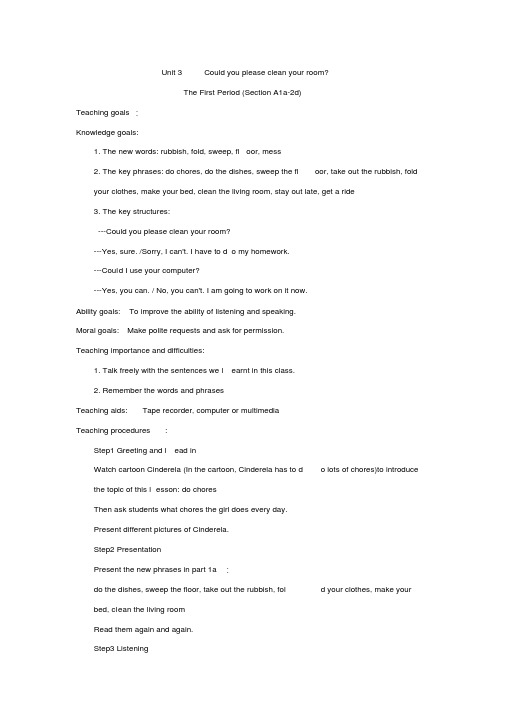
Unit 3 Could you please clean your room?The First Period (Section A1a-2d)Teaching goals:Knowledge goals:1. The new words: rubbish, fold, sweep, fl oor, mess2. The key phrases: do chores, do the dishes, sweep the fl oor, take out the rubbish, foldyour clothes, make your bed, clean the living room, stay out late, get a ride3. The key structures:---Could you please clean your room?---Yes, sure. /Sorry, I can't. I have to d o my homework.---Could I use your computer?---Yes, you can. / No, you can't. I am going to work on it now.Ability goals: To improve the ability of listening and speaking.Moral goals: Make polite requests and ask for permission.Teaching importance and difficulties:1. Talk freely with the sentences we l earnt in this class.2. Remember the words and phrasesTeaching aids: Tape recorder, computer or multimediaTeaching procedures :Step1 Greeting and l ead inWatch cartoon Cinderela (In the cartoon, Cinderela has to d o lots of chores)to introduce the topic of this l esson: do choresThen ask students what chores the girl does every day.Present different pictures of Cinderela.Step2 PresentationPresent the new phrases in part 1a:do the dishes, sweep the floor, take out the rubbish, fol d your clothes, make your bed, cl ean the living roomRead them again and again.Step3 ListeningT: Peter’s room is untidy, peter and his mother are at home, what shoul d they d o?chores or Mom’s chores?1. Now listen to the tape player, then finish part 1b. Peter’sListen it the first time, and check the answers2. Listen it again, then pay attention to the question:T: How does Mum ask peter to help her?----Could you please …?----Yes, sure. / Sorry, I can’t, I have to…Step 4 Pair workLook at the picture in 1a, ask your partner to d o the chores that you see.Example:A: Could you please sweep the fl oor?B: Yes, sure. Can you d o the dishes?ean the living room.A: Well, could you please do them? I ‘m going to clB: No problem.Step 5 Listening1. Look through the tasks in 2a and 2b carefully before listening.2. Play the tape the first time, let the students finish part 2a3. Play the tape the second time and let the stud ents finish the tasks 2b.4. Listen to the tape once more and ask the students to repeat after the tape and checkthe answers by themselves.Question: How to ask for permission?总结请求许可时,常用句型:---Could I…?---Yes, you can. / Sorry, you can’t.Step 6 Group workfather, Peter asks his father if he can do three Student A is Peter, Student B is Peter’smore t hings. Say “yes” or “no”, and give a reason. Such as:A: Could I use your computer?B: Sorry. I’m going to work on it now.A : Well, could I watch TV?B: Yes, you can. But first you have to clean your roomStep 7 Self-studyAsk the students to learn 2d by themselves and finish the tasks of self-study.1. Let students read the conversation loudly, then come up with some questions. Thestudent who raises a question will get 2 points. And the student who answers it will get1 point.2. Read it carefully, then find out the new words and difficult points. Let students showthem in class.3. Role-play the conversation in groups.Step 8 Language points1.Tony, could you please help out with a few things?help out (with something) 是一个动词短语, 表示在某人繁忙或是遇到困难时“给予帮助”。
人教版英语八年级下册Unit3《Couldyoupleasecleanyourroom》说课稿
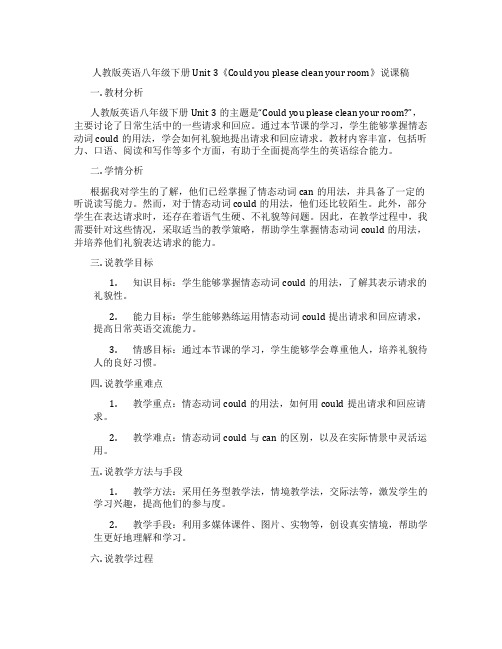
人教版英语八年级下册Unit 3《Could you please clean your room》说课稿一. 教材分析人教版英语八年级下册Unit 3的主题是“Could you please clean your room?”,主要讨论了日常生活中的一些请求和回应。
通过本节课的学习,学生能够掌握情态动词could的用法,学会如何礼貌地提出请求和回应请求。
教材内容丰富,包括听力、口语、阅读和写作等多个方面,有助于全面提高学生的英语综合能力。
二. 学情分析根据我对学生的了解,他们已经掌握了情态动词can的用法,并具备了一定的听说读写能力。
然而,对于情态动词could的用法,他们还比较陌生。
此外,部分学生在表达请求时,还存在着语气生硬、不礼貌等问题。
因此,在教学过程中,我需要针对这些情况,采取适当的教学策略,帮助学生掌握情态动词could的用法,并培养他们礼貌表达请求的能力。
三. 说教学目标1.知识目标:学生能够掌握情态动词could的用法,了解其表示请求的礼貌性。
2.能力目标:学生能够熟练运用情态动词could提出请求和回应请求,提高日常英语交流能力。
3.情感目标:通过本节课的学习,学生能够学会尊重他人,培养礼貌待人的良好习惯。
四. 说教学重难点1.教学重点:情态动词could的用法,如何用could提出请求和回应请求。
2.教学难点:情态动词could与can的区别,以及在实际情景中灵活运用。
五. 说教学方法与手段1.教学方法:采用任务型教学法,情境教学法,交际法等,激发学生的学习兴趣,提高他们的参与度。
2.教学手段:利用多媒体课件、图片、实物等,创设真实情境,帮助学生更好地理解和学习。
六. 说教学过程1.导入:通过播放一段关于孩子们日常生活的视频,引出本节课的主题“Could you please clean your room?”。
2.新课呈现:介绍情态动词could的用法,并通过例句展示如何用could提出请求和回应请求。
人教新目标英语八年级下册讲义—Unit 3 Could you please clean your…

新目标八年级下册Unit 3 Could you please clean your room?讲义一、词性转换Section A1.sweep →(pt.)swept2.throw →(pt.) threw3.fold→(pt.) folded Section B1. lend →(pt.) lent2. hate →(pt.) hated3. stress →(v.) stress4. waste →(v.) waste5. provide →(pt.) provided6. depend→(pt.)depended7. independence →(adj.) independent8. fairness →(adj.) fair9. unfair →(反义词)fair二、短语归纳1. do the dishes 洗餐具2. take out the rubbish倒垃圾3. fold your clothes叠衣服4. sweep the floor 扫地5. make your/the bed 整理床铺6. go out for dinner 出去吃饭7. throw down 扔下8.in surprise 惊讶地9. hang out 闲逛10. hate to do sth. 讨厌做某事11. do chores 做杂务12.enough stress足够的压力13. in order to为了14. provide sth. for sb.向某人提供某物15. get good grades取得好成绩16.mind doing sth. 介意做某事17. depend on依赖;依靠18. look after 照顾,照看19. keep it clean and tidy保持它干净整洁20. get into 进入21. take care of 照顾22. as a result 结果23. do one’ s part in (doing )sth. 做某人分内的事24. get a ride 搭车25.stay out late在外面待到很晚三、句型集萃1. Could you please help out with a few things? 你能帮忙做些事情吗?2.Mom will be back from shopping at any minute now. And she won’t be happy if she sees this mess.妈妈现在随时都会购物回来,如果她看到这些一团糟,会不高兴的。
- 1、下载文档前请自行甄别文档内容的完整性,平台不提供额外的编辑、内容补充、找答案等附加服务。
- 2、"仅部分预览"的文档,不可在线预览部分如存在完整性等问题,可反馈申请退款(可完整预览的文档不适用该条件!)。
- 3、如文档侵犯您的权益,请联系客服反馈,我们会尽快为您处理(人工客服工作时间:9:00-18:30)。
Unit 3Could you please clean your room?
教材解读
本单元的话题是Chores,主要是关于家庭生活,谈论家务琐事及家庭互助,要求学生学会用Could you please ...?和Could I please ...?来委婉地提出请求或征求别人的许可以及如何有礼貌地拒绝别人并表达
自己的理由,陈述自己的好恶。
家庭生活及家务劳动是社会家庭和学生生活中的重要方面,对学生生活习惯的养成、社会行为习惯及家庭责任感的建立起着重要的作用。
通过学习本单元,学生应当能认识到家庭亲情及家庭义务的重要性,应对参加及帮助父母做适当的家务持有积极的态度。
通过单元学习,学生还将了解中西方在这方面的差异,增强他们在日常生活中的沟通和交流能力。
单元目标
一、知识与技能
1.掌握重点单词和短语。
2. 掌握请求帮助和请求允许及应答的句型:Could you please clean your room? Could I please use the car? Yes,you can. No,you can’t. I have to go out.
3. 培养听说读写四项基本技能。
二、过程与方法
采用个人独立思考,两人或多人小组合作、交流的学习策略,积极创设较真实的语言环境,利用教学图片、录音机或多媒体课件来展开课堂的听力和口语交际活动。
三、情感态度与价值观
明确“家务人人有责”的思想,能积极主动地参加家务劳动。
认识到父母照顾家庭的辛劳,养成爱父母、爱家庭、爱家务的好习惯。
学习照顾家庭同时也是照顾自己,培养独立能力,为自己的将来奠定基础。
教法导航
采用直观教学法,遵循以学生为主体的原则。
学法导航
采用Using contest guessing和role playing的学习策略,
课时支配
第1课时:Section A 1a-2d
第2课时:Section A 3a-4c
第3课时:Section B 1a-2e
第4课时:Section B 3a-Self Check
课时教案
I. Teaching aims and demands:
1.Knowledge Objects:
(1).Function: Students learn to make polite requests and ask for permission.
(2).Key vocabulary: rubbish, living room, sweep, do the dishes, take out the rubbish, sweep the floor, fold your clothes, make the bed.
(3).Target Language:
-- Could you please sweep the floor? --Yes, sure.
--Could I please use the car?---No, you can’t. I have to go out.
2.Ability Objects:
Design some tasks to train students’ listening skills and speaking skills.
3.Moral Objects:
Remember to be polite when you ask for help, and to be a good child.
II. Teaching key and difficult points:
1.Key Vocabulary in this period.
2.Target language in this period.
III. Teaching methods:
Audio-lingual methods and PPT
IV. Teaching aids:
A macro-media, some cards, a piece of clothes, a bag of rubbish…
V. Teaching procedures:
Step 1. Warming-up and lead-in
1.Greetings
T: Good morning, students. Today we will learn something about Unit3 Could you please clean your room? First, let’s sing a song together.
(Bingo)
Ss: There was a farmer had a dog…
2.Ask and answer between the teacher and the students. Do you like do chores? What kind of chores do you like?
3.Show students some cards about chores and learn the new words and phrases together: do the dishes ,sweep, sweep the floor ,make the bed ,rubbish ,take out the rubbish ,fold ,fold the clothes, clean the living-room)
(During this period, the teacher plays some games with the students Attract their attention, like High-low voice)
Step 2. Presentation
1.Show the sentence pattern of making polite requests.
Could you please…?
肯定:Sure. /Of course. / Certainly.
Ok./No problem…
否定:Sorry, I can't. /I’m afraid I can’t...
2. Show some pictures about chores and ask students to answer what kind of chores are they.
Activity 1b of listening .
T: Look. Peter’s house is a mess(混乱). It looks dirty. His grandma is coming. He and his mother have to clean it up. Now look at the chart. There are three columns here, Chores, Mom and Peter. Listen to the PPT
and answer: What chores does Peter’s mom do? What chores does Peter do? And finish the chart.
(Check the answers with the students.)
Step 3: Pair-work
Before working in pairs, students should review the information about the chores in the picture and the expressions of the chores in 1a.After that, ask students to practice the conversation with the target language. Then follow the sample dialogue to make conversations with their partners.
A: Could you please sweep the floor? B: Yes, sure. (by performing the action)
A: Could you please do the dishes? B: Sorry, I can’t. I have to do my homework.
(The teacher moves around the classroom and give some help as needed).
Step 4: Homework
Make a conversation between you and your mother, using the sentence pattern “Could you please …?”。
